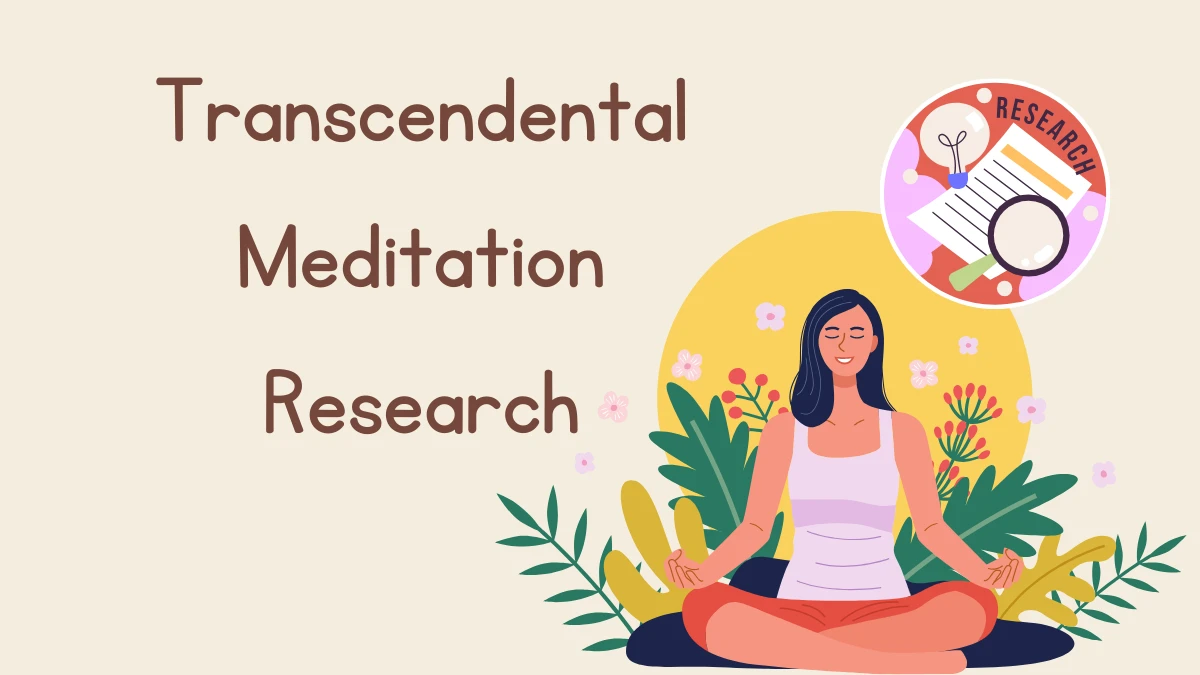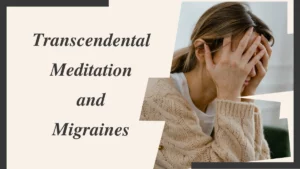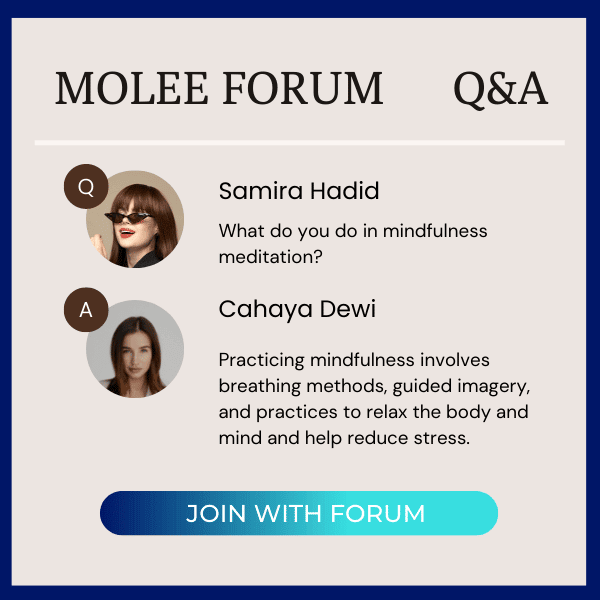Table of Contents
- Foundations of Transcendental Meditation
- Research on the Transcendental Meditation
- Transcendental Meditation and Mental Health
- Transcendental Meditation and Anxiety
- Transcendental Meditation and PTSD
- Transcendental Meditation and OCD
- Transcendental Meditation and Depression
- Transcendental Meditation and Bipolar Disorder
- Transcendental Meditation and Psychosis
- Transcendental Meditation and Stress
- Transcendental Meditation and Trauma
- Dangers and Considerations in TM Practice
- Transcendental Meditation and Neurological Conditions
- Transcendental Meditation and Alzheimer’s Disease
- Transcendental Meditation and Insomnia
- Transcendental Meditation Effects on the Brain
- Transcendental Meditation and Brain Waves
- Transcendental Meditation and Epilepsy
- Transcendental Meditation and Multiple Sclerosis
- Transcendental Meditation and Seizures
- Transcendental Meditation and Tinnitus
- Transcendental Meditation and Parkinson’s Disease
- Transcendental Meditation and Migraines
- Transcendental Meditation and Nightmares
- Transcendental Meditation and Physical Health
- Transcendental Meditation and Enhancement of Well-being
- Exploring the Extraordinary
- Transcendental Meditation in Special Populations
- The Science of Transcendental Meditation
- Transcendental Meditation for Lifestyle and Chronic Conditions
- Transcendental Meditation and Cognitive Functions
- Controversies and Criticisms of Transcendental Meditation
- Beyond the Practice: TM in Society and Culture
- Conclusion
- FAQs on Transcendental Meditation Research
Ever feel like your mental, physical, and emotional well-being could use a boost?
You might be surprised to find that the key could be Transcendental Meditation. In our deep dive into the latest Transcendental Meditation research, we’ll reveal how this simple practice can sharpen your mind, strengthen your body, and elevate your mood.
Get ready to transform your life with insights that promise more than just peace and quiet—they offer a profound shift in your overall health and happiness.
Key Takeaways
- TM can significantly improve focus and cognitive function, reducing symptoms of anxiety and depression.
- Studies show that regular TM practice is associated with lower blood pressure and may reduce the risk of heart disease.
- Engaging in TM has been linked to enhanced emotional well-being, with practitioners experiencing greater peace and reduced stress levels.
- The cumulative effects of TM on mental, physical, and emotional health contribute to a holistic sense of well-being and improved quality of life.
Foundations of Transcendental Meditation
Transcendental Meditation (TM) is a form of meditation developed by Maharishi Mahesh Yogi in the mid-20th century. It stems from the Vedic tradition and is designed to lead an individual towards pure consciousness.
The method is characterized by its effortless nature and the experience of transcending the active layers of thought to reach a state of deep inner calm. Studies continue to explore these meditative states, examining their potential benefits on health and well-being.
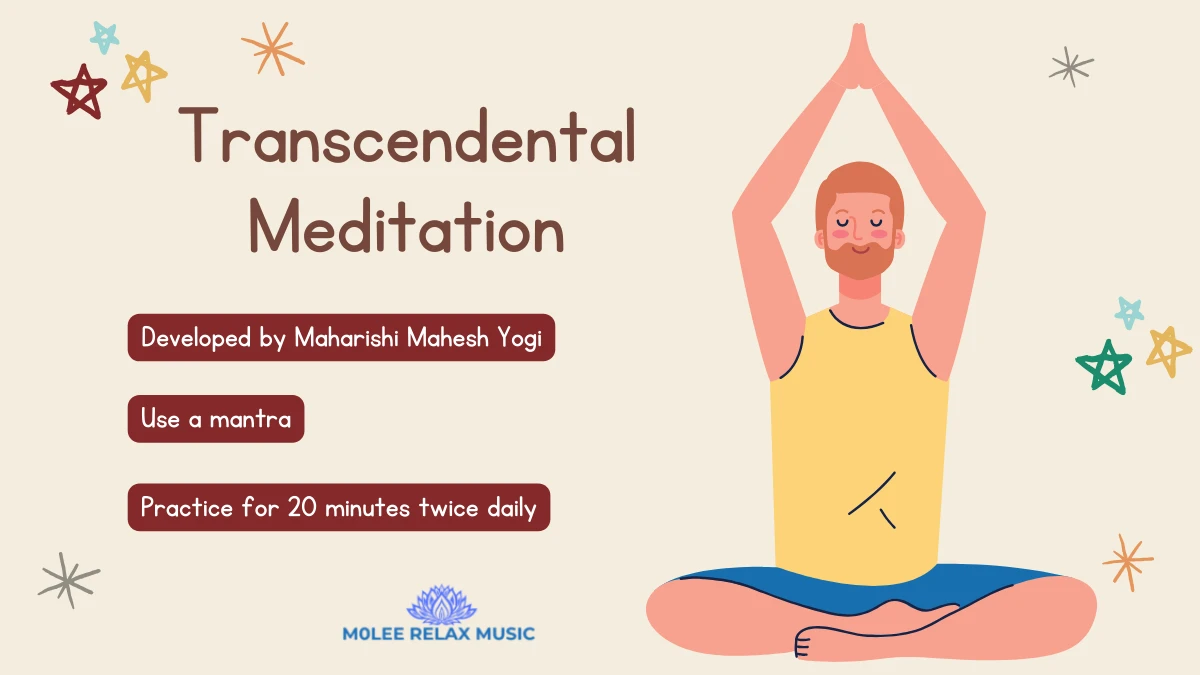
The technique is practiced for 20 minutes twice daily while sitting comfortably with the eyes closed. Individuals silently repeat a specific mantra (a word or sound without meaning) that serves as a vehicle to facilitate the transcendental process.
Research has consistently underscored the importance of effortlessness in this practice, distinguishing it from other forms of meditation that involve concentration or contemplation.
Scientific research into TM has been growing, revealing insights into how regular practice may affect the mind and body. In this scope, investigations look into neural responses to stress, potential benefits for heart health, and implications for cognitive functions among others.
Understanding these mechanisms has profound implications for embracing TM in various spheres, including education and healthcare.
Research on the Transcendental Meditation
Transcendental Meditation research encompasses a broad range of studies examining the effects of this specific meditation technique on mental and physical health.
A significant body of research, including more than 600 studies conducted at over 250 independent universities and research institutions, suggests that TM can lead to various health benefits.
Transcendental Meditation Research at Harvard University
- Harvard research on Transcendental Meditation explores its effects on the brain and health.
- A study by Massachusetts General Hospital and Harvard Medical School focused on how mindfulness meditation, including TM, can alter brain structures in patients with depression (Harvard Gazette).
- Harvard neuro scientists found that meditation can lead to changes in brain regions associated with learning, memory, and emotion regulation (Washington Post).
What does science say about Transcendental Meditation?
Scientific research on Transcendental Meditation suggests that it can have significant health benefits, including reduced stress, improved mental health, and better cardiovascular health.
Studies have shown that TM can decrease anxiety, lower blood pressure, and even reduce the risk of heart disease.
This body of evidence points to TM as an effective non-pharmacological tool for enhancing well-being and managing stress-related health issues (Medical News Today).
What are the scientifically proven benefits of Transcendental Meditation?
- Reduced stress levels: Studies repeatedly show TM’s capability to lower stress responses.
- Improved cardiovascular health: Clinical trials document a beneficial impact on heart health.
- Enhanced mental clarity: Research indicates that TM practitioners often experience increased cognitive function.
- Reductions in high blood pressure: Evidence-based studies, including those conducted through randomized clinical trials, have found TM to be helpful in managing blood pressure.
Transcendental Meditation and Mental Health
Transcendental Meditation has been researched for potential benefits in improving mental health conditions such as anxiety and depression. Studies suggest TM can help reduce psychological stress and symptomatic severity in various mental health disorders.
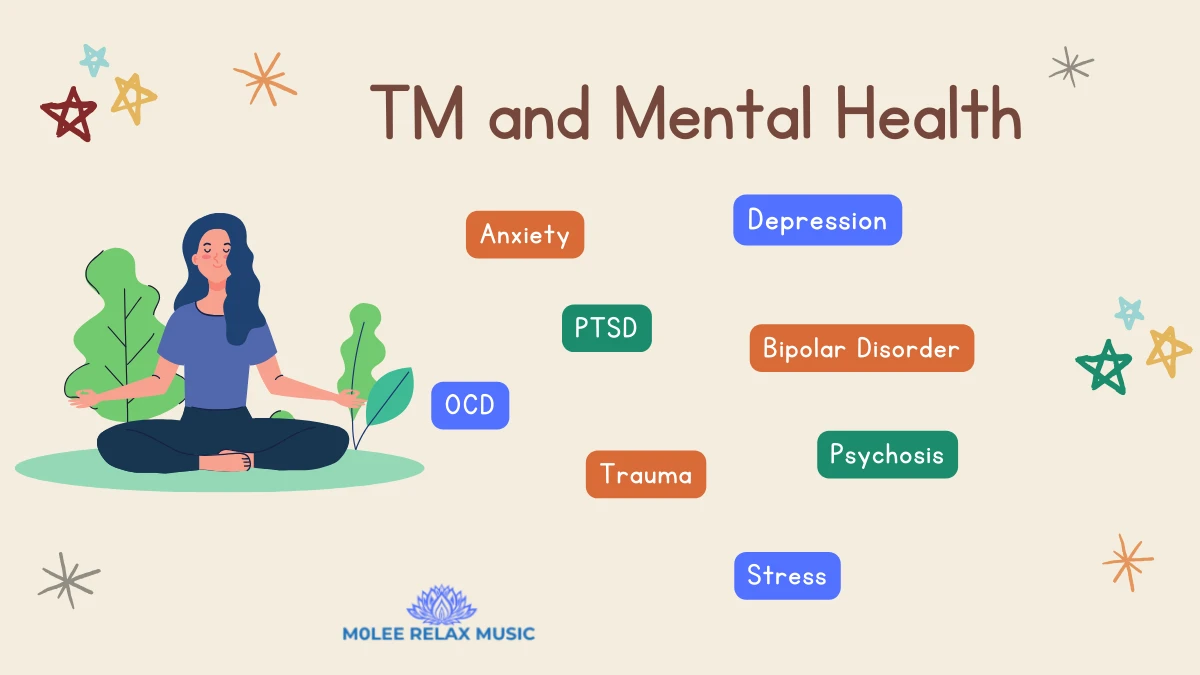
Transcendental Meditation and Anxiety
Research indicates that TM may have a calming effect on the nervous system, helping to ease symptoms of anxiety. A systematic review showed TM led to increased parasympathetic response, which is related to relaxation and stress reduction.
Transcendental Meditation and PTSD
For individuals with Post-Traumatic Stress Disorder (PTSD), TM has been proposed as a method to alleviate symptoms. Programs incorporating TM for veterans and those with PTSD have found reductions in stress and improved emotional well-being.
Transcendental Meditation and OCD
Though specific research on TM’s effect on Obsessive-Compulsive Disorder (OCD) is more limited, the relaxation and mindful techniques integral to TM could contribute to symptom relief based on its association with anxiety reduction.
Transcendental Meditation and Depression
TM is posited to influence mood regulation, which may be beneficial for those suffering from depression. A study focusing on an adult Muslim population showed that TM practice reduced anxiety and stress, which are factors often linked with depressive episodes.
Read our article on TM and Depression and how TM helps individuals to have a better life.
Transcendental Meditation and Bipolar Disorder
In the context of Bipolar Disorder, TM might aid in managing mood swings through stress reduction. However, specific studies on TM and Bipolar Disorder require further exploration to understand its impact thoroughly.
Transcendental Meditation and Psychosis
Limited data exists on the role of TM in treating psychosis. However, relaxation techniques like TM are considered complementary approaches that could potentially help with the overall stress management in individuals with psychosis.
Transcendental Meditation and Stress
Numerous studies underscore the stress-reducing properties of TM. By promoting a deep state of rest, TM is thought to lessen psychological distress and improve one’s sense of wellness.
Transcendental Meditation and Trauma
TM can serve as a non-invasive technique to address the psychological impact of trauma. Its effects on heart rate and blood pressure may provide physical health benefits, which concurrently support mental recovery.
Dangers and Considerations in TM Practice
It is necessary to approach TM practice with caution. While it is generally considered safe, individuals with pre-existing mental health conditions should consult with healthcare professionals before beginning TM to prevent any adverse effects.
Read our article on TM Dangers and get to know more about transcendental meditation
Transcendental Meditation and Neurological Conditions
Transcendental Meditation has been explored as a therapeutic tool for various neurological conditions. This section reviews research findings related to TM’s impact on specific neurological disorders.
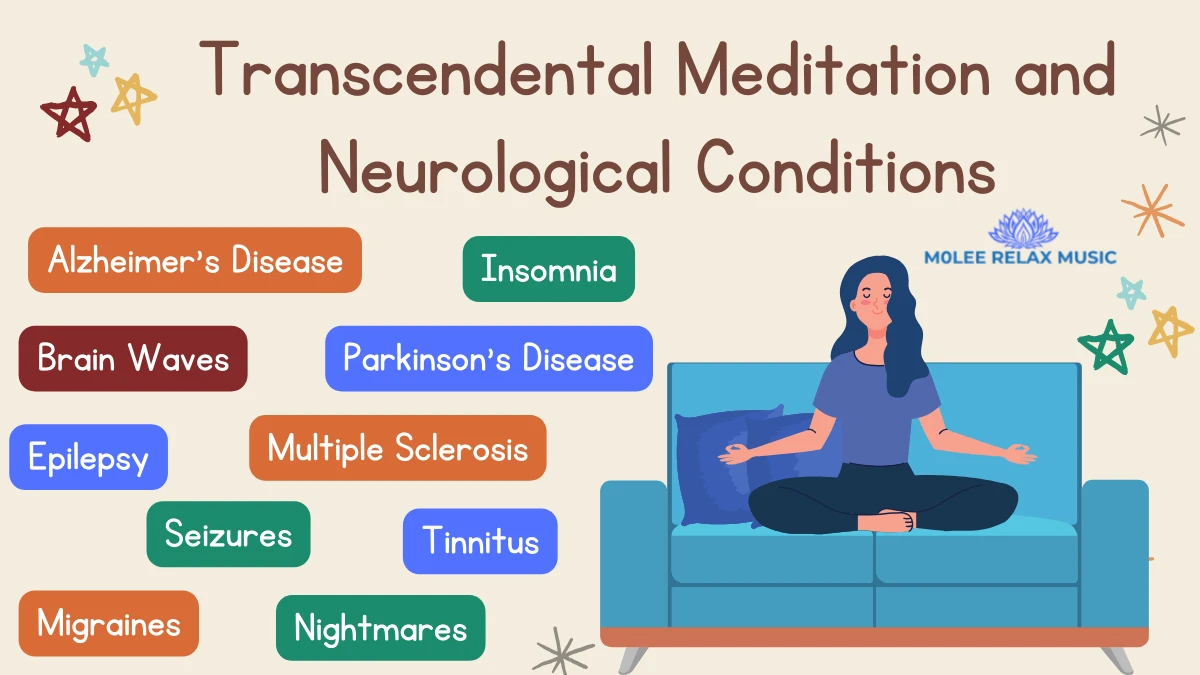
Transcendental Meditation and Alzheimer’s Disease
Studies have suggested that TM may support cognitive function in Alzheimer’s Disease patients. It is posited that TM helps in reducing stress, which can exacerbate the symptoms of Alzheimer’s.
Transcendental Meditation and Insomnia
TM has been found to improve sleep quality in individuals with insomnia. The practice encourages relaxation, potentially facilitating the transition to sleep.
Transcendental Meditation Effects on the Brain
Research indicates that TM can lead to increased brain coherence and connectivity. This, in turn, may contribute to enhanced cognitive abilities and emotional regulation.
Transcendental Meditation and Brain Waves
Regular TM practice appears to influence brain wave patterns, encouraging the dominance of alpha waves. These are associated with a state of relaxed alertness.
Transcendental Meditation and Epilepsy
There is preliminary evidence to suggest that TM could reduce the frequency of seizures in epilepsy, potentially through the stabilization of neuronal excitability.
Transcendental Meditation and Multiple Sclerosis
TM may have a positive effect on the quality of life for patients with Multiple Sclerosis, potentially by reducing fatigue and depression, two common symptoms of the disease.
Transcendental Meditation and Seizures
Although more research is needed, some studies imply that TM might play a role in seizure management by promoting neuro psychological health.
Transcendental Meditation and Tinnitus
Individuals with tinnitus may experience some relief through TM, likely due to stress reduction and improved coping strategies.
Transcendental Meditation and Parkinson’s Disease
TM might offer benefits for Parkinson’s patients, such as stress relief and enhanced motor and non-motor symptoms management.
Explore How TM aids for Parkinson’s patients to make their lives smooth and comfortable.
Transcendental Meditation and Migraines
Research suggests that TM could help in reducing the frequency and severity of migraines, likely due to its stress-reducing effects.
Transcendental Meditation and Nightmares
Practicing TM may reduce the occurrence of nightmares by inducing relaxation and possibly by helping to process stress and trauma.
Transcendental Meditation and Physical Health
Transcendental Meditation has been investigated for its potential in improving various aspects of physical health. Research points to benefits in cardiovascular health, hypoglycemic control, and substance dependency management.
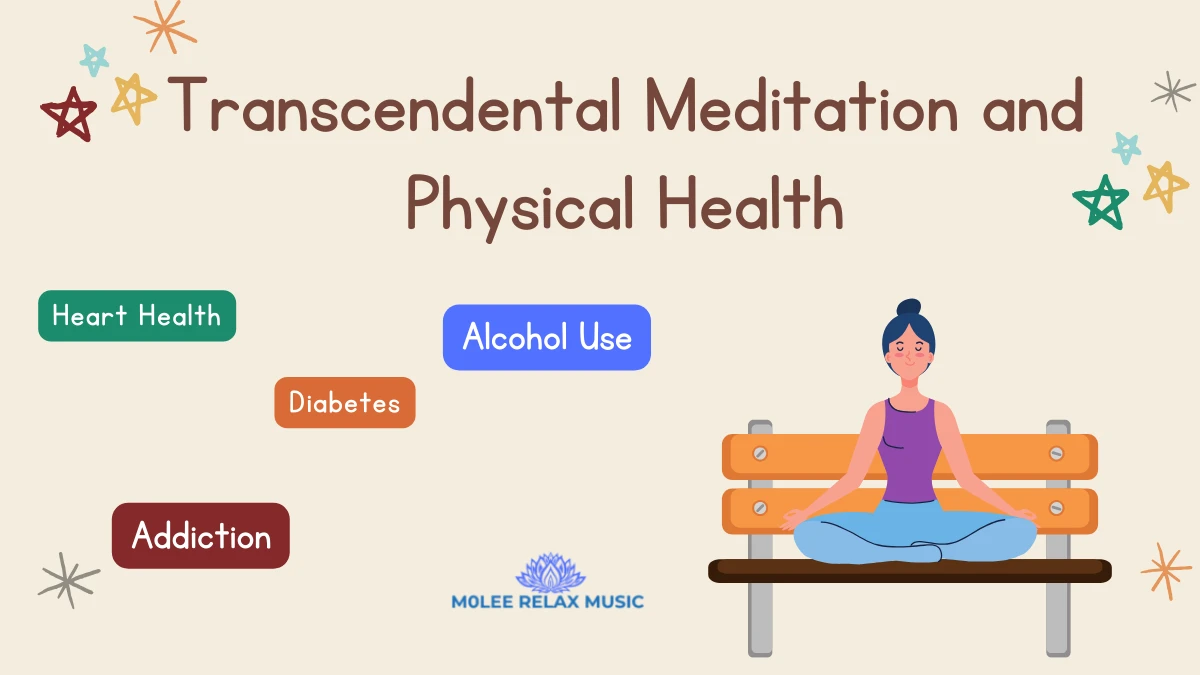
Transcendental Meditation and Heart Health
Studies indicate that TM may have a positive effect on heart health. For instance, TM practice has been associated with reduced blood pressure, which is a significant risk factor for heart disease.
An article in the Journal of the American Heart Association discusses the effects of Transcendental Meditation on blood pressure, citing a lack of significant changes in blood pressure in one group, while noting other research shows reductions.
Transcendental Meditation and Diabetes
TM might also play a role in diabetes management. The influence of stress reduction through meditation has been explored regarding its impact on blood glucose levels.
Although less researched than its cardiovascular benefits, preliminary findings suggest potential for TM to assist in glycemic control, which is critical for diabetes patients.
Transcendental Meditation and Alcohol Use
Regarding alcohol use, the stress-relieving properties of TM have also been studied. Some research has found that individuals engaging in regular TM practice may experience a reduction in alcohol consumption.
The influence of TM on psychological stress might explain the reduced reliance on alcohol as a coping mechanism.
Transcendental Meditation and Addiction
Finally, when it comes to addiction, TM might offer support in recovery processes. By promoting relaxation and stress relief, TM can contribute to reductions in addictive behaviors.
Although more research is needed, some evidence supports TM as a complementary approach in the treatment of various addictions, alongside conventional therapies.
Transcendental Meditation and Enhancement of Well-being
Transcendental Meditation (TM) has been linked to various improvements in well-being through extensive scientific research. Specific benefits include hormonal balance, enhanced creativity, better concentration, and an increased ability to manifest personal goals.
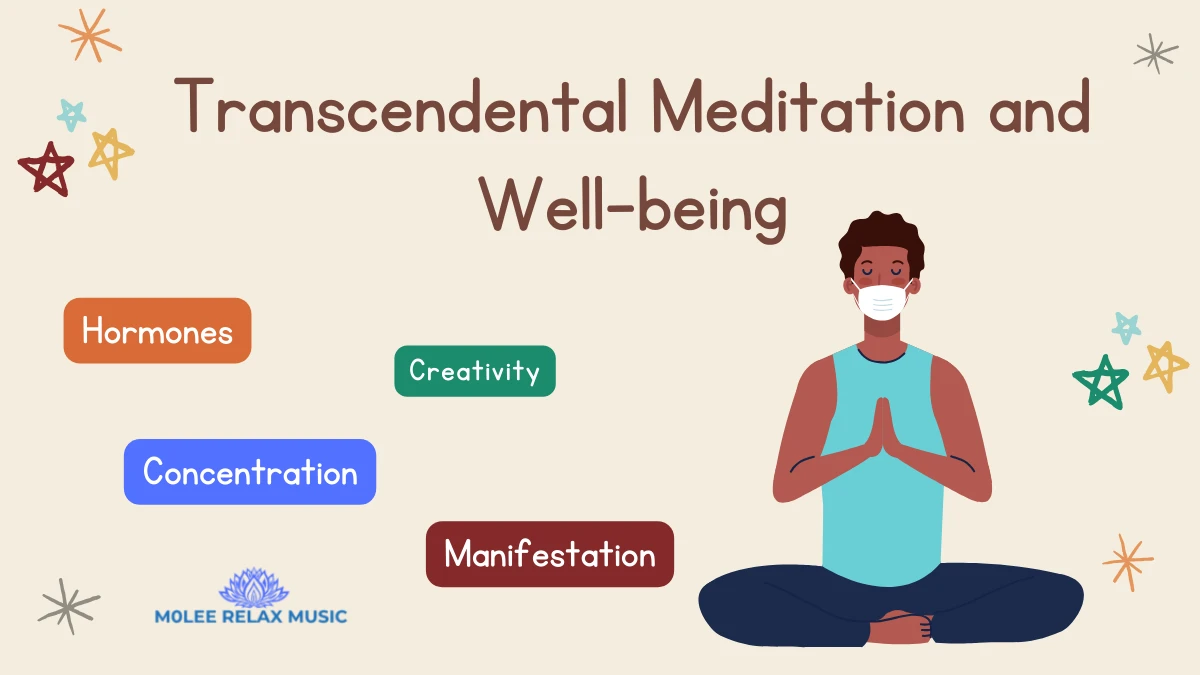
Transcendental Meditation and Hormones
Practitioners of TM have been found to experience changes in hormone levels indicative of reduced stress. Research suggests an increase in parasympathetic response, which is associated with the relaxation and rejuvenation of the body.
For example, a study has shown that TM can lead to decreased cortisol levels, often referred to as the stress hormone, thus signaling a reduction in stress.
Transcendental Meditation and Creativity
TM may foster creativity by promoting a relaxed yet alert state of mind conducive to brainstorming and problem-solving. Studies have indicated that individuals who practice TM often report an enhanced ability to generate new ideas and to engage in creative thinking.
Transcendental Meditation and Concentration
Regular engagement in TM has been correlated with improved concentration and attention. It provides a means of decreasing cognitive load, allowing individuals to focus more intensely and for longer periods. This can be especially beneficial in educational and professional settings where sustained attention is required.
Transcendental Meditation and Manifestation
Finally, TM is thought to aid in the manifestation of personal objectives by enhancing the clarity of one’s goals and the commitment to achieving them. This aspect of TM practice aligns with increased self-actualization and personal development, enabling individuals to clarify and pursue their aspirations more effectively.
Exploring the Extraordinary
The field of Transcendental Meditation research extends into extraordinary phenomena, with particular studies scrutinizing claims that traditionally elude scientific explanation. This exploration delves into the realms of levitation and the underpinnings of such extraordinary claims within the framework of science.
Transcendental Meditation and Levitation: Myth or Reality?
The practice of Transcendental Meditation is sometimes linked to the ancient claim of yogic flying, a form of levitation described in traditional texts. Recent discussions often refer to this phenomenon as the “siddhi” practice — an advanced TM technique.
Research explicitly investigating levitation is scarce and often mired in debate. While anecdotal evidence and testimonial accounts exist, there is a lack of empirical research to support actual levitation.
The phenomenon is frequently observed as practitioners seemingly hopping while in a meditative state, which some interpret as a preliminary stage of yogic flying.
The Science Behind TM and Extraordinary Claims
Scientific studies have approached Transcendental Meditation from various angles to validate its benefits. Investigators probe beyond anecdotal accounts to measure physiological and neurological indicators.
In particular, rigorous examinations have found that long-term TM practitioners exhibit a lower brain response to stress and pain. Additionally, research has also indicated potential cognitive and health-related improvements related to consistent TM practice, including increased parasympathetic response and decreased stress indicators.
However, the extraordinary claims, such as achieving a state of ‘enlightenment’ or developing supernormal abilities, continue to be controversial, urging further empirical investigation to substantiate these assertions.
Transcendental Meditation in Special Populations
Transcendental Meditation (TM) is increasingly recognized for its potential benefits in special populations, including individuals with sleep disorders, children with autism, and individuals with ADHD. Research indicates tailored TM techniques can support the unique needs of these groups.
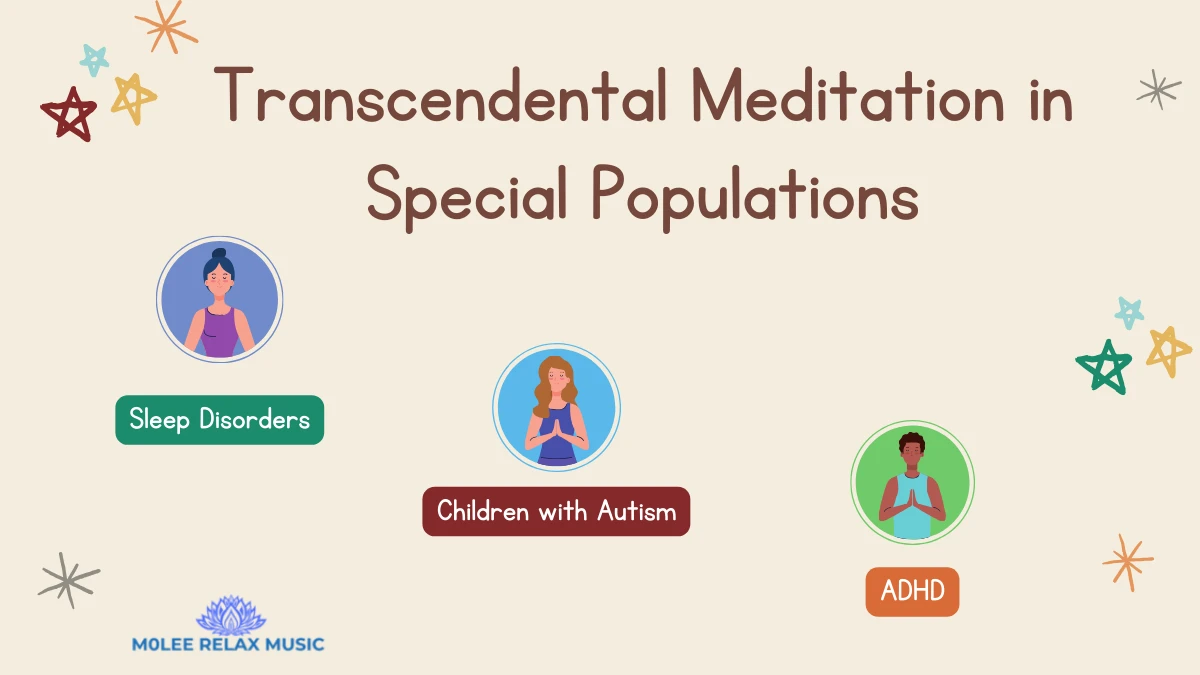
Transcendental Meditation and Sleep Disorders
Individual studies highlight TM’s role in improving sleep quality by enhancing parasympathetic nervous system activity, which is crucial for relaxation and slumber.
A pilot study showcased how long-term TM practitioners had a significantly lower brain response to stress and pain, which could contribute to better sleep. (Transcendental Meditation Research)
Addressing Sleep Challenges: The Role of TM in Promoting Restful Sleep
TM may aid in decreasing the time it takes to fall asleep (sleep onset latency) and improve efficient sleep patterns. The practice is suggested to normalize sleep cycles, potentially benefiting insomnia sufferers. Regular TM could thus serve as a complementary approach to traditional sleep therapies. (Scientific Research on TM)
Transcendental Meditation and Its Effects on Children with Autism
Children on the autism spectrum may experience significant stress and anxiety, which can exacerbate behavioral challenges. TM offers a non-pharmacological method to alleviate stress.
For instance, the calming effect of TM can improve the general well-being and coping mechanisms of children with autism, providing a means of regulating emotions more effectively.
Tailoring TM Techniques for Individuals with ADHD
For individuals with Attention Deficit Hyperactivity Disorder (ADHD), TM can offer a structured strategy to help cope with symptoms. The practice of silently reciting a mantra can enhance focus and potentially reduce the hyperactivity associated with ADHD.
Studies have noted patterns of increased parasympathetic response in TM practitioners, which may be particularly beneficial for those with ADHD. (Efficacy of TM)
The Science of Transcendental Meditation
Transcendental Meditation (TM) has been the focus of numerous scientific studies exploring its impact on health and wellbeing. Researchers have examined how TM affects brain activity, epilepsy, and neurodegenerative diseases.
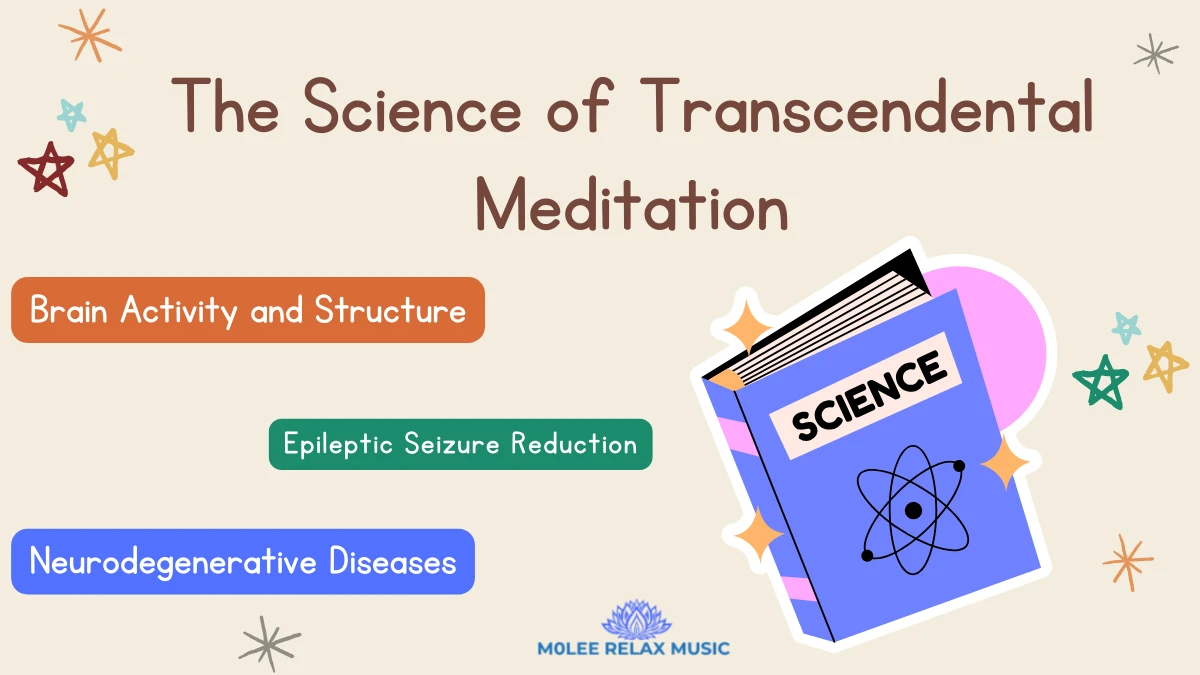
Neuroscientific Findings: TM’s Influence on Brain Activity and Structure
Neuroimaging research has shown that during TM practice, individuals experience increased coherence in frontal alpha brain waves, typically in the 8-10 Hz frequency. This suggests a state of relaxed alertness.
Additionally, TM has been associated with increased grey matter density in regions of the brain related to emotional regulation and self-awareness.
The Connection Between TM and Epileptic Seizure Reduction
Research on TM’s effects on epilepsy has indicated a possible reduction in seizure frequency among practitioners. These findings could be attributed to the increased stress regulation and enhanced brain coherence observed in TM practitioners, suggesting a potential therapeutic role for TM in epilepsy management.
TM’s Potential in Slowing the Progression of Neurodegenerative Diseases
Emerging evidence points to the potential of TM in slowing the progression of certain neurodegenerative diseases. TM may exert protective effects on the brain by enhancing neural efficiency and plasticity, which could be pivotal for individuals with conditions such as Alzheimer’s disease, though further research is needed to solidify these initial observations.
Transcendental Meditation for Lifestyle and Chronic Conditions
Transcendental Meditation (TM) provides a non-pharmacological method for managing various lifestyle-related and chronic health conditions. This section explores how TM can integrate into the assist in substance abuse recovery, mitigate chronic pain and migraines, and its potential effects on tinnitus.
Exploring TM’s Role in Recovery from Substance Abuse and Addiction
TM offers a non-invasive approach to support recovery from substance abuse and addiction. Its ability to induce a state of deep rest and relaxation can be particularly beneficial in reducing stress-related triggers and cravings that often lead to relapse.
The Impact of TM on Patients with Chronic Pain and Migraines
Patients with chronic pain conditions, including migraines, can benefit from the regular practice of TM due to its effects on the body’s stress response, which may lessen the intensity and frequency of pain episodes. Moreover, TM practice can improve patients’ overall quality of life by enhancing their psychological well-being.
Can TM Alleviate Symptoms of Tinnitus and Chronic Ear Ringing?
Although more research is needed, preliminary studies suggest that TM might be effective in reducing the perceived severity of tinnitus. The practice’s soothing and mind-calming effects are hypothesized to contribute to a decrease in the awareness and distress caused by tinnitus.
Transcendental Meditation and Cognitive Functions
Transcendental Meditation (TM) has been widely studied for its potential benefits on cognitive functions. Peer-reviewed research suggests improvements in memory, attention, creativity, and cognitive resilience as a result of consistent TM practice.
Enhancing Memory and Attention through TM
Studies indicate that TM can lead to improvements in both memory and attention. An analysis of multiple randomized controlled trials highlighted in scientific publications suggests that TM practitioners may experience enhanced cognitive function, potentially due to the stress-reducing effects of the practice.
TM’s Role in Creativity and Problem-Solving
Creativity and problem-solving abilities are essential cognitive functions that can be positively influenced by TM. The practice is thought to promote a relaxed yet alert state of mind, conducive to creative thinking, as discussed in various academic journals.
Can TM Improve Concentration and Academic Performance?
Research indicates the potential for TM to improve concentration and, by extension, academic performance. A study of college students revealed that those who practiced TM showed significant improvements in brain functioning and cognitive development, as reported on science platforms.
TM and the Aging Brain: A Look at Cognitive Decline and Dementia
TM may offer protective effects against cognitive decline and dementia in the aging population. A publication by the National Center for Biotechnology Information suggests that TM could play a role in maintaining cognitive functions in the context of aging and neurodegenerative diseases, which can be found in their research archive.
Controversies and Criticisms of Transcendental Meditation
Transcendental Meditation has been subject to various debates. While proponents herald its benefits, skeptics question its efficacy and raise concerns about its practice.
Addressing the Skepticism: Is TM Truly Beneficial or Just Placebo?
Critics of TM often argue that its effects can be attributed to the placebo effect, rather than any specific technique. They point to studies lacking rigorous methodological standards that are necessary to distinguish TM’s benefits from those of relaxation or general mindfulness.
Acknowledgment from researchers regarding the difficulty in separating TM’s outcomes from a placebo’s indicates that further scientific scrutiny is required.
Debunking Myths: Separating Fact from Fiction in TM
It’s essential to separate anecdotal claims from scientifically verified facts. Some myths, like TM enabling individuals to obtain supernatural abilities, have been discredited, while benefits like stress reduction and improved cognitive function have found some support in research.
Still, the efficacy of TM should be considered in light of empirical evidence, and it is recommended to critically evaluate the scientific credibility of the sources promoting TM.
Is there a downside to Transcendental Meditation?
While often considered safe, TM practice is not free from potential health risks. Instances of individuals experiencing increased anxiety, psychosomatic issues, and episodes related to psychological distress (meditation-induced psychosis) have been documented.
It is crucial for individuals with pre-existing mental health conditions to approach TM with caution and consult healthcare professionals before practicing.
Can I learn TM myself?
While some basic meditation practices can be self-taught, Transcendental Meditation is traditionally learned through personalized instruction by a certified TM teacher. This ensures that you receive the correct technique and guidance tailored to your individual experience.
To fully benefit from TM and its evidence-based outcomes, it’s recommended to find a certified TM teacher who can provide you with the proper training and support throughout the learning process.
Beyond the Practice: TM in Society and Culture
Transcendental Meditation has extended its reach beyond individual practice, influencing various aspects of popular culture and sparking research into future applications.
TM and Its Influence on Popular Culture and Celebrities
The practice has notably permeated popular culture, with celebrities openly endorsing it. Film director David Lynch, for instance, attributes much of his creative process and relief from anxiety to TM, which has spurred interest among his followers. Moreover, the David Lynch Foundation actively promotes TM for stress reduction among at-risk populations.
The Future of TM: Trends, Research, and Innovations
With a growing body of research supporting its benefits, TM is seeing innovations in its application and investigation into its mechanisms. Studies such as those listed on ScienceDirect are deepening understanding of transcendent states, suggesting future cross-cultural research could expand the field significantly.
TM’s Role in Social Change and Community Health Initiatives
Programs integrating TM into community health initiatives are demonstrating positive impacts. For example, research highlighted on PubMed underscores TM’s potential in reducing stress among health professionals, shaping it as a vital tool within broader social change efforts to enhance community wellbeing.
Conclusion
Research into Transcendental Meditation reveals consistent benefits associated with stress reduction and a range of physiological improvements. TM also garners attention in broader reviews of meditation practices, reaching similar conclusions about its potential to induce tranquil states of consciousness.
In the realm of physiological health, links have been found between TM and its effects on cardiovascular risk profiles.
TM’s role in personal development and holistic health appears to be more about nurturing a balanced inner state that can contribute to overall wellbeing.
Researchers and individuals interested in the nexus of meditation and well-being are encouraged to consider TM as a component in a comprehensive approach to health. Far from being a panacea, it should be regarded as part of a suite of lifestyle choices that can contribute to improved mental and physical health outcomes.
FAQs on Transcendental Meditation Research
Is transcendental meditation debunked ?
Transcendental Meditation has not been debunked. It is a widely practiced technique with numerous studies highlighting its potential benefits. Research suggests that it can help reduce stress, improve mental clarity, and enhance emotional well-being.
What are benefits of transcendental meditation?
The benefits of Transcendental Meditation include a decrease in anxiety and stress, improved sleep patterns, increased productivity, and better overall mental health. Practitioners often report a heightened sense of calm and a greater ability to cope with the demands of daily life.
Does TM really work?
Many individuals who practice TM attest to its effectiveness, and scientific studies have shown that it can yield measurable positive effects on mental and physical health. However, as with any wellness practice, individual experiences with TM can vary.


